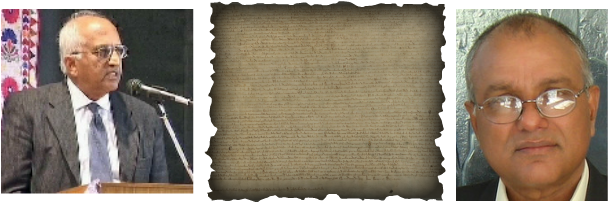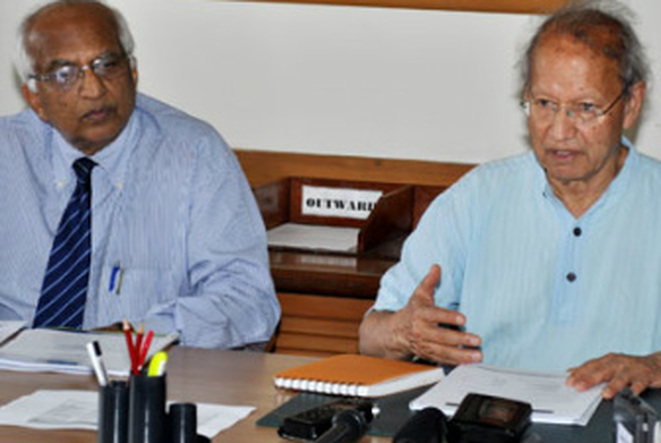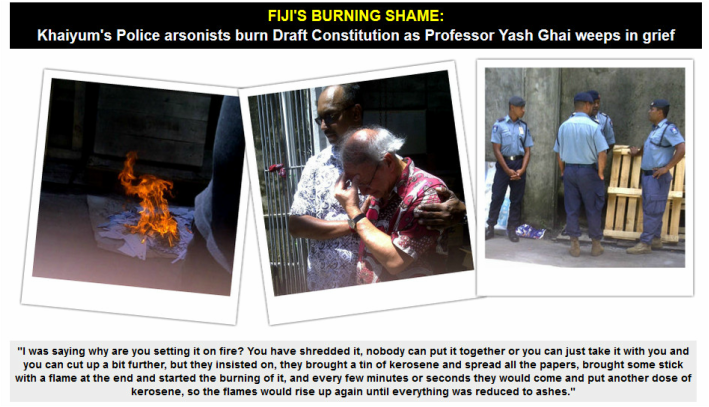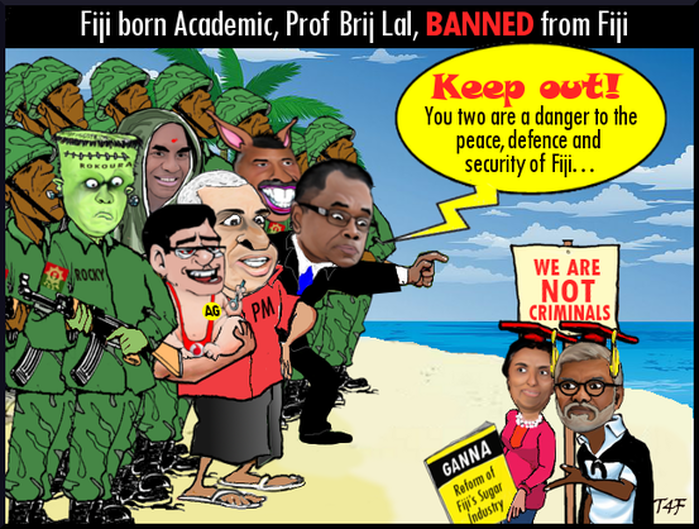The English speaking world is currently interested in the old British document, the Magna Carta (‘great charter’) which was signed or sealed some 800 years ago by King John of England, as a ‘treaty’ with rebellious barons who wished to limit the king’s powers and abuses.
It is natural indeed for the English to celebrate as the Magna Carta is an important part of the evolution of English law and history.
No doubt as a service to its readers the Fiji Sun (15 June 2015) published two full-page articles by Professor Satendra Nandan (‘Magnificence of Magna Carta’ and Professor Richard Herr (‘Why is Magna Carta relevant to Fiji today’).
Herr explained reasonably well the origins and evolution of the Magna Carta, the three or four important clauses that have come down today in the universal rule of law and good parliaments, while pointing to a few similar clauses in the Bainimarama Government’s 2013 Constitution.
While also dwelling on some of the positive lessons of the Magna Carta, Professor Satendra Nandan went on to claim that the 2013 Fiji Constitution was Fiji’s very own ‘Magna Carta’.
Very strangely, both these learned professors failed to examine the extent to which Fiji under the Bainimarama Government or its 2013 Constitution, correspond or do not correspond to what was in the original Magna Carta.
Nandan’s omission is particularly disturbing, given that he was a member of the Bainimarama appointed Yash Ghai Constitution Commission, which widely consulted and was supported by the people of Fiji, but its draft report was callously aborted by Bainimarama, in order to unilaterally impose the 2013 Constitution which Nandan is now enthusing over.
For students of history, economics, society and law, the Nandan and Herr articles illustrate how any historical document like the Magna Carta, or religious documents like the Bible or Bhagavad Gita or the Koran, can be selectively misused for different purposes.
More generally, students should note that it is an exaggeration to claim (as many do) that the Magna Carta, is the first document in the world to embody the protection of human rights, the rights of parliaments, or the rule of law.
Such claims are historically wrong, and merely reflect Anglo-centric bias, which Bainimarama is quite coincidentally in the process of removing from Fiji’s flag.
The Original Magna Carta
This week, readers can find any number of quite interesting interpretations of the Magna Carta, on the web: just google ‘Magna Carta’
But to read all 63 provisions of the Magna Carta in simple modern English, connect to this British Library link: http://www.bl.uk/magna-carta/articles/magna-carta-english-
This document has marked those clauses which are still relevant in English law, and what have since been dropped or changed. You might also find it interesting to look up the odd Old English words like ‘scutage’ or ‘dower’ (not exactly dowry).
What all writers (including Herr) accurately inform is that only a mere 3 (or 4) out of the original 63 clauses are still part of English law; the right to just, fair and timely trial; guaranteed freedom of the church; guaranteed liberties of the capital city London; and the principle that the law applies to all, including the rulers.
But these few clauses are not necessarily the ‘key principles expressed in the Magna Carta’ as Herr claims, but merely what the followers value today.
There were 59 other clauses, some of which were historically specific and far more important to those signing, and many which may seem totally obnoxious to the modern rule of law, human rights, and equality of men, women and children.
The ‘great principles’ of the Magna Carta, like beauty, are ‘in the eyes of the beholder’.
Nandan critically (and correctly) notes that the Magna Carta did not prevent ‘subjugation of women, genocide, slavery or conquests of the worst kind in other lands across the globe by European powers including Great Britain.’
Nandan also readily criticizes his own adopted home country, Australia, for its continued failure to humanely deal with the problems of refugees, asylum seekers, and the marginalized (presumably the Aboriginals), and the negative treatment of the Human Rights Commissioners trying to tackle these problems.
But neither Herr nor Nandan cast their critical eyes on Fiji.
What Nandan and Herr like
Nandan and Herr both acknowledge that one of the most important Magna Carta principles to come down to the present day was that ‘no king and no ruler was above the rule of law.’
Sure, Clause 61 of the original Magna Carta does state that any baron or free man could take the ruler to court for transgressions of the principles of the Magna Charter.
But Nandan and Kerr ignore that Bainimarama and the Fiji Military Forces refused to follow the rule of law when they removed a lawfully elected government in 2006.
Nandan and Herr ignore that Bainimarama’s 2013 Constitution declares that Bainimarama and his collaborators are above the rule of law, by granting them total immunity for any crimes committed between 2000 and the 2014 elections.
Nandan and Herr both like Clause 39 which states ‘No free man shall be seized or imprisoned, or stripped of his rights or possessions, or outlawed or exiled, or deprived of his standing in any way, nor will we proceed with force against him, or send others to do so, except by the lawful judgment of his equals or by the law of the land’.
Yet the Bainimarama Government unfairly deprived FNPF pensioners of a part of their contractual incomes, by a decree.
Moreover, another decree threw out the pensioners’ Burness/Shameem case which had already been received to be heard by the Fiji courts.
Denying the FNPF pensioners their day in court also blatantly trashes another clause liked by Nandan and Kerr (Clause 40) which states that ‘To no one will we sell, to no one deny or delay right to justice’.
Some can remember that there have been serious crimes in Fiji since 2000 which have never been investigated by the state, or brought to court.
There also have been possible crimes committed by politically powerful people, whose cases are being delayed month after month, allegedly because judges cannot be found.
Nandan and Kerr approvingly note that one of the strong points of the Magna Carta was that rulers must not exact taxes from people without their approval.
Yet for eight years, the Bainimarama Government took taxes from the people of Fiji, without the approval of any parliament, and spent large sums of money (some on themselves), while refusing to be accountable to the Auditor General even today.
What Nandan and Kerr totally ignore
The Magna Carta was overseen by the Archbishop of Canterbury and endorsed by the recognized religious leaders of the day, a reflection of the enormous political power that the Christian churches wielded in the Middle Ages, in England and in Europe.
Whether people today are religious or not, Clause 1 and Clause 63, must be considered to be of prime importance to the Magna Carta, both stating that ‘the English Church must be free’.
Yet in Fiji, the Bainimarama Government restricted the freedoms of the Methodist Church, the largest Christian church in Fiji, but not those of other churches and religions.
But note, within a couple of months after signing, King John asked the Catholic Pope in the Vatican to nullify the Charter, which he obligingly did, calling it ‘illegal, unjust, harmful to royal rights and shameful to the English people.’
While Nandan and Kerr are extolling a Magna Carta whose implementation was strongly influenced by the Christian churches, Bainimarama is allegedly banishing the churches from Fiji’s politics.
Nandan and Kerr ignore Clause 61, which sets out how the ‘barons’ or nobles of England (comparable to the Chiefs of Fiji) were to select 25 from among themselves in order to implement the Magna Carta.
Because in Fiji, the Bainimarama Government has closed down the equivalent Great Council of Chiefs, who are to have no role in the affairs of the parliament and the laws of Fiji.
Nandan and Kerr ignore Clause 52 which states ‘To any man whom we have deprived or dispossessed of lands, castles, liberties, or rights, without the lawful judgment of his equals, we will at once restore these’.
Yet the Bainimarama Government did not restore the lawful rights and property of FNPF pensioners, removed ‘without the lawful judgement of his equals’ and not restored even after the restoration of democracy and an elected parliament.
Some prominent individuals, like Dr Brij Lal, and Dr Padma Lal, have been exiled by the Bainimarama Government without the judgement of a court.
Their banning would also be contradicted by Clause 42 which stated ‘it shall be lawful for any man to leave and return to our kingdom unharmed and without fear…. except in time of war’.
Clause 13 protected all the rights of the capital city of London, yet the Bainimarama Government removed all the elected mayors and councilors of Suva and other cities and towns, and appointed its own ‘special administrators’.
Clause 62 fully pardoned all subjects involved in the dispute with King John. In Fiji, the Bainimarama Government continues to imprison those who were in bitter dispute with him in 2000.
Of course, a few elements in the Magna Carta are still important in modern times, even in Fiji, but there are far more clauses which would be considered discriminatory and outright objectionable, and perhaps one or two on forests, quite progressive.
What else is ignored
Curious readers and students might want to examine the following fascinating clauses in the Magna Carta, which ought to raise an eyebrow or two:
* Clause 6: heirs may not be given in marriage to people of ‘lower social standing’: what only the upper classes are to enjoy the benefits of marrying rich heirs?
*Clauses 10 and 11: find out why it is bad luck for Jews who have lent money to English people (Barings and the Rothschilds were not around then!)
* Clause 15: barons could tax their subjects to fund the costs of making their eldest son a Knight or marry off their eldest daughter. How dare someone in Fiji recently complain about the chief of their leased native land demanding a special payment to help in his child’s wedding?
* Clause 21: earls and barons shall be fined ‘only by their equals’ What? Commoners cannot sit in judgement of chiefs?
* Clause 31: no ruler shall take wood without the consent of the owner: bad luck to the Fijian owners of mangroves or tiri which have been cut down illegally by ministerial permission and the area reclaimed.
* Clause 20: a free man shall be fined seriously only for a serious offence, ‘but not so as to deprive him of his livelihood’. Bad luck, prisoners in Fiji who cannot earn their livelihood while in prison (except apparently for an ex-super-market owner).
* Cause 50: the relatives of certain ‘criminals’ may be removed from all offices in England. What? It is alright to punish people for crimes committed by their relatives?
* Clause 54: a woman can appeal for the arrest or imprisonment of someone only for the death of her husband, not the death of others? Bad luck, women if you see some one killing your children or neighbors
* Clause 57: Welshmen unfairly deprived of their property without the lawful judgement of their equals will have their property returned to them. Very few in former colonies know that the first people to be viciously colonized by England, were not blacks or browns or yellow people in Africa or Asia or the Pacific, but whites in Wales, Scotland and Ireland, large numbers of whom were forced to emigrate to the ends of the earth.
* Clause 59 of the Magna Carta promised that the King will return all the unfairly taken rights, sisters and hostages related to the Scottish King. The poor Scottish.
The English bias
It is historically wrong for some to claim (as they do) that the Magna Carta was the ‘first document in the world to protect human rights’ or the origin of today’s declarations of human rights, such as the US Declaration of Independence, or modern parliaments, or systems of law.
Historically, there have been far more ancient documents encoding laws for societies: Hammurabi in Babylon (2100 BC), several codes in China (2200 BC to the one in 536 BC by Tsz-ch’an); the 700 BC laws of Romulus written around 300 BC; and my favorite which I used in my economics reading lists thirty years ago, the truly magnificent Indian treatise, Arthashastra, written around 350 BC by sage Kautilya (aka Chanakya).
You also have the ancient religious documents (‘laws’) of Hinduism (Bhagavad Gita and the Ramayana), Buddhism (Tripitaka or Tipitaka), and Christianity (the Bible’s Old and New Testaments).
All these ancients documents are the equivalent of laws for people, to guide and regulate rulers, while protecting the rights of ordinary citizens.
It is therefore an exaggeration for Professor Richard Herr to imply that the important principles of the Magna Carta, or even the three or four clauses that he and Professor Satendra Nandan like, followed the British Union Jack around the world.
The English frequently breached the principle of equality before the law when it came to the black, brown and yellow peoples they colonized globally, even in Fiji, or for that matter, the white colonized people in Wales, Scotland, and Ireland, where resentment against the English still simmers.
Professor Nandan forgets that he was a member of the Bainimarama appointed Yash Ghai Constitution Review Commission which heard 7000 submissions, drafted a pretty good draft constitution which would have been democratically approved by a People’s Assembly, safeguarding the rule of law in Fiji, if due process had been followed by Bainimarama.
But that Yash Ghai Draft was thrown out (and symbolically burnt) by Bainimarama, and while Commission members Yash Ghai and Penny Moore to their credit protested, Professor Nandan quietly departed, yet still returns periodically to offer his service to his political idols.
There is a bit of poetic irony in that while Professor Satendra Nandan passionately extols the ‘Magnificence of the Magna Carta’ as England’s great contribution to the countries where the Union Jack traveled, Nandan’s own political heroes are currently removing the Union Jack from the Fiji flag





